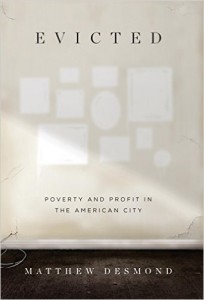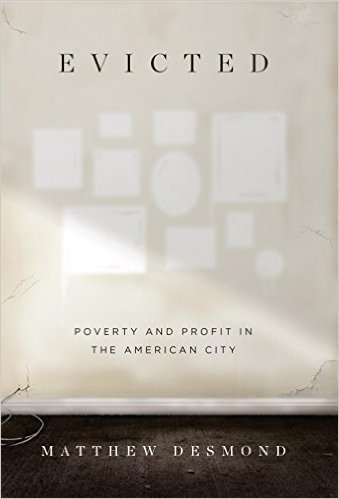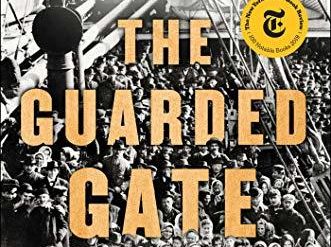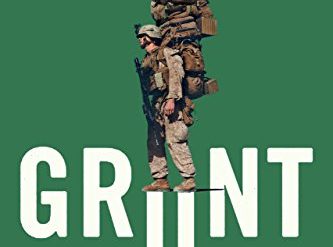
Between May 2008 and December 2009, a doctoral candidate in sociology named Matthew Desmond at the University of Wisconsin, Madison, lived in the poorest neighborhoods of Milwaukee in an effort to reach an understanding of poverty. He persuaded two landlords with property in the communities to allow him to shadow them and study a number of their tenant families.
Estimated reading time: 6 minutes
Most days, Desmond recorded virtually every conversation that ensued and took notes as well, producing five thousand single-spaced pages of text over the course of a year and a half. He also took thousands of photos, conducted one hundred interviews with people who were not his primary subjects, read the existing literature, and reached out to welfare officials and others in government to gain a broader view of the linkage between poverty and housing. The result of his work is an extraordinarily powerful book, Evicted: Poverty and Profit in the American City. If this book is used to inform the making of housing policy at every level — federal, state, and local — our society would be much the better for it.
Evicted: Poverty and Profit in the American City by Matthew Desmond (2016) 434 pages ★★★★★
“The fourth poorest city in America”
Though Milwaukee is poorer than most large cities, Desmond’s study of poverty and housing there could have been conducted in Newark, Detroit, Chicago, Baltimore, Philadelphia, St. Louis, or many other Northeastern or Midwestern cities. There are lessons to be learned for cities elsewhere in America as well, large and small. As the author points out, “Every year in this country, people are evicted from their homes not by the tens of thousands or even the hundreds of thousands but by the millions.” By no means is the phenomenon limited to the Rust Belt.
In Evicted, Desmond follows the lives of several Milwaukee families, both black and white, before, during, and after their experience with eviction. Simultaneously, he tracks the work of two landlords, an African-American woman named Sherrena Tarver and her husband with thirty-six badly maintained units in ghetto properties and a Caucasian man named Tobin Charney who owns a rundown mobile home park containing 131 deteriorating trailers. As the author takes pains to point out, Milwaukee is heavily segregated. Apparently, only African-Americans live in the ghetto, and only whites live in the trailers. (Previously an increasing influx of Latinos began edging into white territory where blacks were made unwelcome.)
A book about homelessness that gets to the root of the problem
However, other than the often blatant racism that greets any black person who seeks to rent outside the ghetto, the lived experience of all these families is very similar. Again and again, they face a choice between paying rent or settling medical, electric, or gas bills. (For most of the tenants included in this study, rent absorbs upwards of 70 percent of their income, a common situation nationwide among poor people.) Their lives are roiled by drug addiction, incarceration, mental illness, or debilitating accidents or diseases. Yet, as Desmond makes clear, the greatest disruption in their lives is their eviction from one short-term rental to another, sometimes punctuated by episodes of living in shelters or on the streets.
Moving involuntarily, often with little or no notice, means that government checks and notices about appointments with government agencies go astray at old addresses. Compounding the problem, their furniture and other household goods are relegated to storage units — and then often lost for nonpayment because they’re struggling to save enough for rent. Every one of Desmond’s subjects suffers from a litany of troubles. Nothing is simple or sure in their lives.
Poverty, homelessness, and the profit motive
Desmond concludes from his study that “[e]viction is a cause, not just a condition, of poverty.” Not once does he suggest that the practice of repeatedly evicting tenants be criminalized, though I would: repetition means the landlord, not just the tenant, is doing something wrong.
However, if there is any overarching theme in Evicted, it is that poverty is a big money-maker for those like Sherrena and Tobin with the capital and the thick skins necessary to deal with their endlessly needy tenants. Desmond spells out two principal paths to profit for what I would call (though Desmond doesn’t) slumlords:
- Like groceries and other necessities, rents in poor neighborhoods tend to be higher for comparable properties than in more affluent areas. This is particularly true for the relatively few poor tenants who manage to snag highly coveted Section 8 housing vouchers, which limit their rental cost to 30 percent of their income and guarantee regular payment to landlords.
- Buying already dilapidated properties and allowing them to deteriorate further saves the large sums that should be devoted to maintenance. Both Sherrena and Tobin routinely refuse to pay for essential repairs for sinks, tubs, toilets, broken windows, and other problems. This is not careless neglect but a conscious strategy to maximize profits.
Though Desmond doesn’t mention it, condo conversion can also mean huge profits for landlords.
Tobin has grown wealthy from his run-down trailer park. He nets half a million dollars annually. Though Sherrena claimed a net worth of $2 million in speaking with Desmond, she was later reported to have gone bankrupt.
What is to be done?
Desmond views this tragic situation as calling for radical change in national policy. “We have affirmed provision in old age, twelve years of education, and basic nutrition to be the right of every citizen,” he writes, “because we have recognized that human dignity depends on the fulfillment of these fundamental human needs. And it is hard to argue that housing is not a fundamental human need.”
A change of this magnitude might seem overwhelming, but Desmond finds hope in the promise of a much smaller and simpler change: “Low-income families on the edge of eviction have no right to counsel. But when tenants have lawyers, their chances of keeping their homes increase dramatically. Establishing publicly funded legal services for low-income families in housing court would be a cost-effective measure that would prevent homelessness, decrease eviction, and give poor families a fair shake.” Yes, and bring a measure of stability to the notoriously volatile poor neighborhoods in our cities.
About the author
Matthew Desmond received his Ph.D. in Sociology from the University of Wisconsin and is now a Harvard faculty member and a MacArthur Fellow. Evicted is his fourth book.t
For related reading
I’ve also reviewed the author’s later book, Poverty, by America (How to end poverty in America).
This is one of the many Good books about racism and Good books about economic inequality. It’s also included in my list of 13 enlightening books about poverty in America.
For another enlightening book on the subject of housing, see Golden Gates: Fighting for Housing in America by Conor Dougherty, reviewed at Why are so many homeless in America?
Like to read books about politics and current affairs? Check out Top 10 nonfiction books about politics.
If you enjoy reading nonfiction in general, you might also enjoy:
- Science explained in 10 excellent popular books
- Great biographies I’ve reviewed: my 10 favorites
- My 10 favorite books about business history
And you can always find my most popular reviews, and the most recent ones, on the Home Page.



























